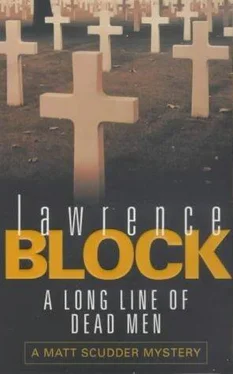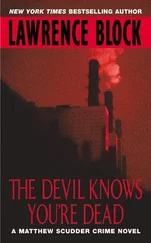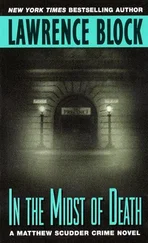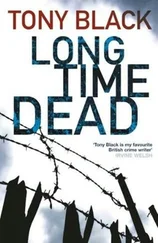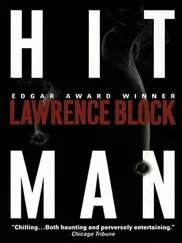Lawrence Block - A Long Line of Dead Men
Здесь есть возможность читать онлайн «Lawrence Block - A Long Line of Dead Men» весь текст электронной книги совершенно бесплатно (целиком полную версию без сокращений). В некоторых случаях можно слушать аудио, скачать через торрент в формате fb2 и присутствует краткое содержание. Жанр: Триллер, на английском языке. Описание произведения, (предисловие) а так же отзывы посетителей доступны на портале библиотеки ЛибКат.
- Название:A Long Line of Dead Men
- Автор:
- Жанр:
- Год:неизвестен
- ISBN:нет данных
- Рейтинг книги:5 / 5. Голосов: 1
-
Избранное:Добавить в избранное
- Отзывы:
-
Ваша оценка:
- 100
- 1
- 2
- 3
- 4
- 5
A Long Line of Dead Men: краткое содержание, описание и аннотация
Предлагаем к чтению аннотацию, описание, краткое содержание или предисловие (зависит от того, что написал сам автор книги «A Long Line of Dead Men»). Если вы не нашли необходимую информацию о книге — напишите в комментариях, мы постараемся отыскать её.
A Long Line of Dead Men — читать онлайн бесплатно полную книгу (весь текст) целиком
Ниже представлен текст книги, разбитый по страницам. Система сохранения места последней прочитанной страницы, позволяет с удобством читать онлайн бесплатно книгу «A Long Line of Dead Men», без необходимости каждый раз заново искать на чём Вы остановились. Поставьте закладку, и сможете в любой момент перейти на страницу, на которой закончили чтение.
Интервал:
Закладка:
"I know."
"Indeed you do. He went to mass every morning, and I don't know why he went or what he thought it did for him. I don't know why I go, either, or what I think it does for me." He was silent for a moment. Then he said, "Your mother's not alive still, is she?"
"No, she died years ago."
"So did mine. It was cancer killed her, but I always thought it was Dennis's dying that brought it on. She was never the same after she got the telegram." He looked at me. "We're orphans, the two of us," he said, and waved a hand at the windows, with the storm," he said, and took a drink.
"The other day," I said, "a lawyer I know told me that man is the only animal that knows he'll die someday. And he's also the only animal that drinks."
"It's an unusual thing for a lawyer to say."
"He's an unusual lawyer. But do you think there's a connection?"
"I know there is," he said.
I don't know how we got around to women. He didn't seem to need them as much now, he said, and wasn't sure whether it was the years or the drink that deserved credit for the change.
"Well, I stopped drinking," I reminded him.
"By God, so you did. And now no woman's safe from Inwood to the Battery."
"Oh, they're safe," I said.
"Are you still seeing the other one?"
"Now and then."
"And does herself know about it?"
"I don't think so," I said, "although she gave me a turn the other day. I was trying to get hold of the woman whose husband was stabbed to death in Forest Hills in February. I mentioned to Elaine that I was going to have to go out there and see her. A moment later she told me to enjoy myself with the widow, and I read more into the remark than she'd put in it. I guess I looked startled, but I managed to cover it."
That reminded him of a story, and he told it, and the conversation meandered like an old river. Then a little later he said, "The widow in Forest Hills. Why ever would you go to see her?"
"To find out if she knew anything."
"What could she know?"
"She might have seen something. Her husband might have said something to her." I told him some of the questions I'd ask, a few of the points I'd try to cover.
"Is that how you do your detecting?"
"That's part of it. Why?"
"Because I've no idea how you do what you do."
"Most of the time neither do I."
"Ah, but of course you do. And you try all these different approaches until something works. I'd never have the imagination to devise them all, or the patience to keep at it. When there's something I need to know, there's only one way I have of finding it out."
"What's that?"
"I go to the man who has the answer," he said, "and I do what I have to do to make him tell me. But if I didn't even know who to go to, why, I'd be entirely lost."
If the rain had let up I might have gone home earlier. I began to flag sometime around four-thirty or five in the morning, and there was a time when the conversation died down and I glanced over at the window. But it was still pouring, and instead of pleading exhaustion and heading for the door I pushed my Perrier aside and poured one more cup of coffee from the thermos. A little later I caught a second wind, and it carried me past dawn and down to St. Bernard's for the butchers' mass.
There were fifteen or twenty of us in the little side chapel, including seven or eight men from the meat market, dressed in white aprons just like Mick's, some of them stained as his was stained. There were several nuns as well, and a couple of housewives and some men dressed for the office. And a few elderly people, men and women, including one who was a dead ringer for the murderous Eamonn Dougherty, right down to the cloth cap.
We left when the mass was over, without having taken Communion. The sky was still overcast but no rain was falling. Mick's Cadillac was where he'd parked it, in the reserved space in front of Twomey's funeral parlor. Twomey was out in front and gave us a wave when he saw us. Mick gave him a smile and a nod.
"It's good days for Twomey," he said. "His business is more than twice what it was, now that they're dying of AIDS all around him. It's an ill wind, eh?"
"That's the truth."
"I'll tell you another," he said. "Every wind's an ill wind."
He dropped me at my door. I went upstairs and tried to make as little noise as possible opening the door, not wanting to wake Elaine if she was still sleeping.
When I opened the door she was standing there, wearing a robe I'd bought for her. The look on her face told me right away that something was wrong.
Before I could ask, she said, "You don't know, do you? You haven't heard?"
"Heard what?"
She put a hand out, took mine. "Gerard Billings was killed last night," she said.
24
For a full twelve years, Gerard Billings had been the weather reporter for an independent New York broadcast channel. While he was officially known as the chief meteorologist, his function was primarily reportorial. His colorful clothing, his irrepressible personality, and his evident willingness to make a fool of himself on camera were more important factors in his rise than his ability to read a weather map.
He was on the air twice a day, at 6:55 P.M., just before the close of the 6:30 news program, and again at 11:15, right in the middle of the late news and before the extended sports summary. Typically, he would arrive at the station at five in the afternoon, work out what he was going to say and get his maps and charts in order, and go out for dinner after the broadcast. Sometimes he would linger over dinner for a couple of hours, then return to the studio. Other nights he'd go home for a nap and a change of clothes, then go back to the studio for his second stint of the day. He'd get there between 10 and 10:30; he didn't need as much time to prepare, because he would be using the same charts and giving essentially the same report.
At seven that Tuesday night he went straight home to the apartment on West Ninety-sixth where he'd lived since his divorce four years previously. He ordered Chinese food from a restaurant on Amsterdam Avenue. Shortly after ten he went downstairs and caught a cab driven by a recent Bengali immigrant named Rakhman Ali. As the cab waited to make a left turn into Columbus Avenue, it was sideswiped by a car that was attempting to pass it on the right. The driver leaped from his car and got into a loud argument with Rakhman Ali, at the climax of which he drew a handgun, shot Ali three times in the face and upper chest, then yanked open the door of the cab and emptied his gun into Ali's passenger. He then sped away in his own vehicle, which was variously described as anywhere from two to twelve years old. Witnesses seemed to agree that it was a four-door sedan, that it was dark in color, and that it had seen better days.
Elaine, watching the news, knew something was wrong even before they introduced a substitute weatherman to fill in for Billings. There were no jokes about the absent forecaster being under the weather, and all of the reporters in the studio seemed to be keeping a grim secret. It turned out that they had learned of Billings's death moments before they went on the air and decided to hold the story pending notification of kin. This decision was overruled toward the end of the broadcast when they realized they were in danger of getting scooped by their competitors; accordingly, the anchorwoman made the unfortunate announcement right after the sports wrap-up.
"I didn't know what to do," Elaine said. "I knew you were at Grogan's and I looked up the number and thought about calling, but what were you going to do in the middle of a rainy night? Besides, for all I knew it was just what it looked like, an argument over a traffic accident that got out of control. It happens all the time, and everybody's got a gun these days, and maybe they'd catch the poor loser who did it within the hour, and why ruin your evening with Mick over that?
Читать дальшеИнтервал:
Закладка:
Похожие книги на «A Long Line of Dead Men»
Представляем Вашему вниманию похожие книги на «A Long Line of Dead Men» списком для выбора. Мы отобрали схожую по названию и смыслу литературу в надежде предоставить читателям больше вариантов отыскать новые, интересные, ещё непрочитанные произведения.
Обсуждение, отзывы о книге «A Long Line of Dead Men» и просто собственные мнения читателей. Оставьте ваши комментарии, напишите, что Вы думаете о произведении, его смысле или главных героях. Укажите что конкретно понравилось, а что нет, и почему Вы так считаете.
